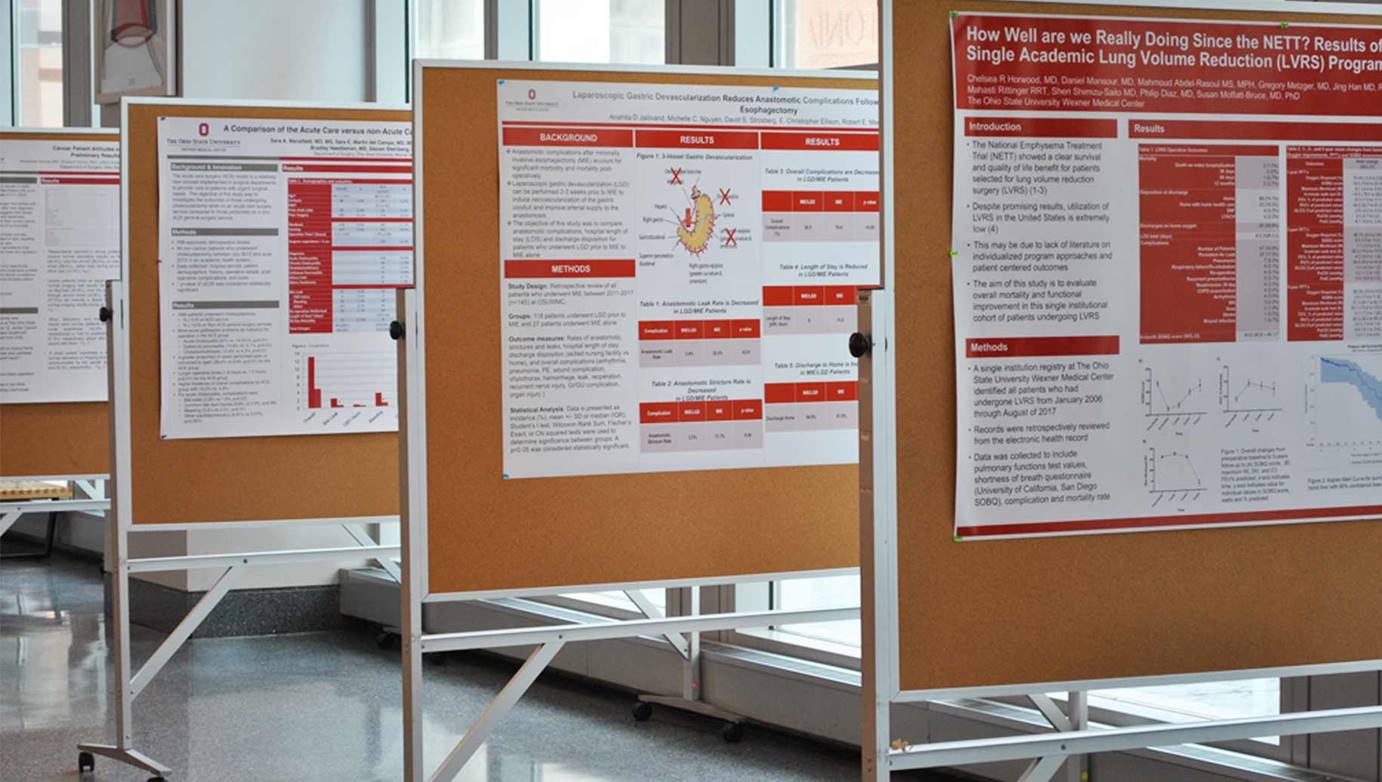In addition to Ohio State's outstanding clinical surgical training, our program emphasizes comprehensive career and professional development activities beyond the operating room. These activities are designed to provide our residents with additional academic advancement, increased confidence, expanded skills for the research and grant process and better positioning for future employment and fellowship opportunities.
Faculty Mentorship
Trainees benefit from weekly one-on-one meetings with their research mentor(s), laboratory and research group meetings, quarterly DOS Research Training Program (RTP) meetings, quarterly mentor/mentee evaluations and semiannual meetings with the RTP director. Additionally, every mentor will help their resident create an individualized development plan (IDP) and provide research mentorship aligned with the principles outlined in the AAMC Mentor/Mentee Postdoctoral compact.

Unique Coursework
We’ve developed specific courses to help our surgical residents advance their professional skills and potential. This coursework includes instruction on critical analysis of the biomedical literature, hypothesis development, scientific models and methodologies, biostatistics, funding aspects for research, effective oral presentations, responsible conduct of research, interview skills, strategies for effective time management, work/life balance, leadership skills and discussion of historical and current topics in specific disciplines such as immunology and their relevance to surgery. Trainees will also have the opportunity to learn about the fundamentals of healthcare economics, accounting and finance, ethical guidelines, managed care, healthcare law and practice management. These courses include:-
Career Development for Surgeons (SURG 8501)
- Applications of Immunology in Surgery (Journal Clubs) (SURG 8900)
- Practice Management for Surgeons Course (SURG 7010-7060)
- Communication Through Scientific Writing (SURG 8505)
DOS Research Training Program Competencies
Upon successful completion of the training program, trainees will have met these core competencies:- Formulate a significant research question and hypothesis
- Acquire skills for research design
- Acquire skills in translational and/or clinical research methodologies
- Acquire and apply skills in biostatistics
- Acquire and apply research ethics principles
- Acquire and apply science communication skills by preparation of abstracts, publications and poster and oral presentations
- Identify research funding opportunities and learn the essential components for preparation of research grant proposals to NIH and other extramural sponsors
Professional Networking
Surgical trainees are encouraged to expand their networking skills, which will serve them well throughout their career. We provide them with opportunities to network with students, peers and faculty through interdisciplinary courses, seminars, workshops, College of Medicine MMS quarterly meetings with physician trainees in other specialties, quarterly DOS RTP meetings and participation in local, regional, national and international scientific conferences.Leadership Experience
We want our general surgical residents to become leaders in their field of expertise, and we provide many opportunities for the development of such skills. We encourage residents to take on institutional and departmental committee work, lead meetings and accept chairing responsibilities, initiate and implement special projects, participate as resident/trainee members in professional organizations and write journal and review articles.Self Reflection
Self-reflection is an essential part of lifelong learning and critical to improving a surgeon’s skills and their ability to provide quality patient care and to conduct quality research. Our general surgery residents are encouraged to engage in self-reflection activities, including creating an individualized development plan at the outset of their research training experience, completing pre- and post-training research skills self-assessments, completing a quarterly trainee progress update report and reviewing mentor quarterly evaluations. Residents also receive frequent feedback on scientific presentation skills and other core competencies through oral presentations and writing abstracts, review articles, book chapters, IRB protocols and research grants.Recognition of Achievement
We understand the importance of recognizing the achievement of our residents.
